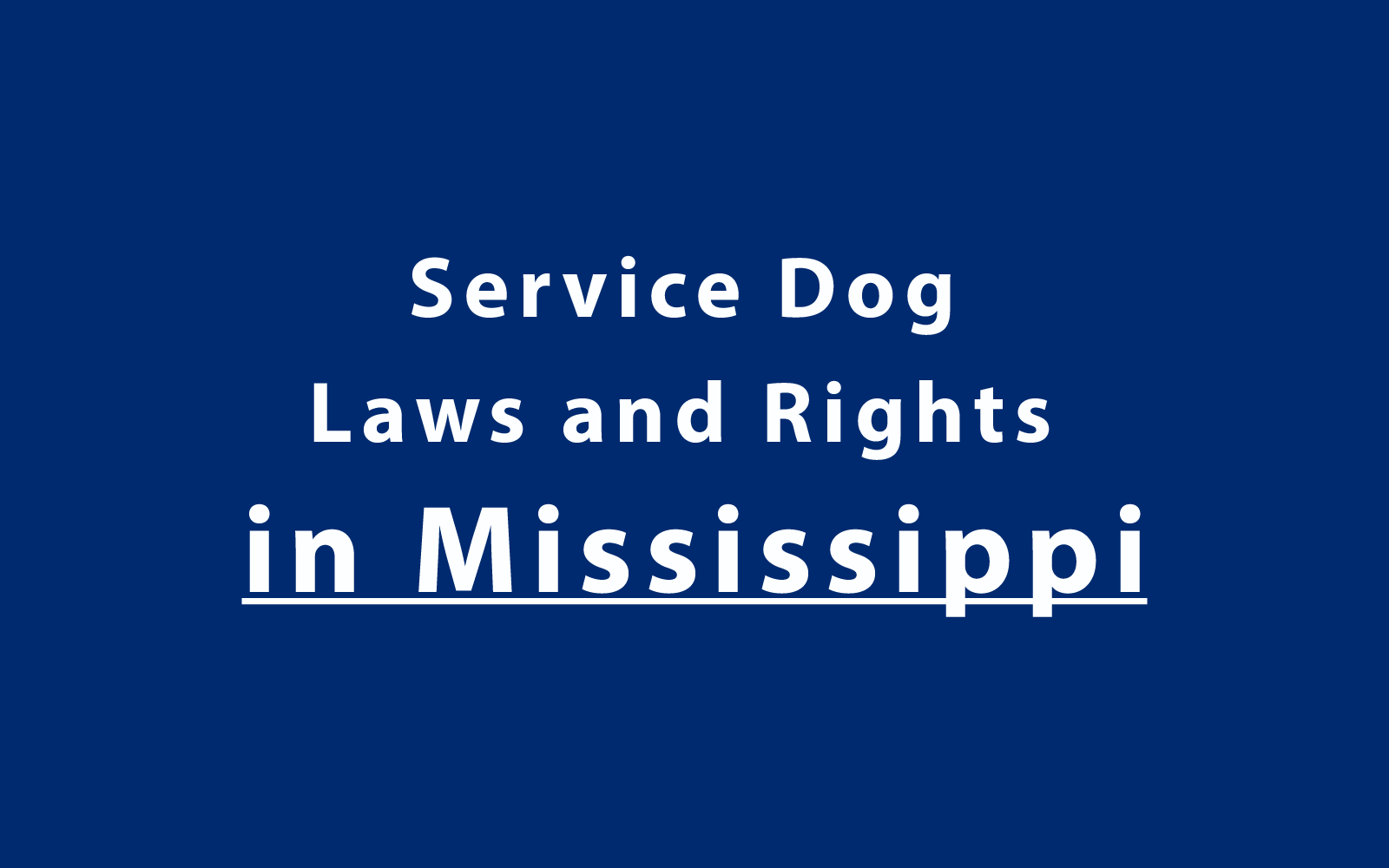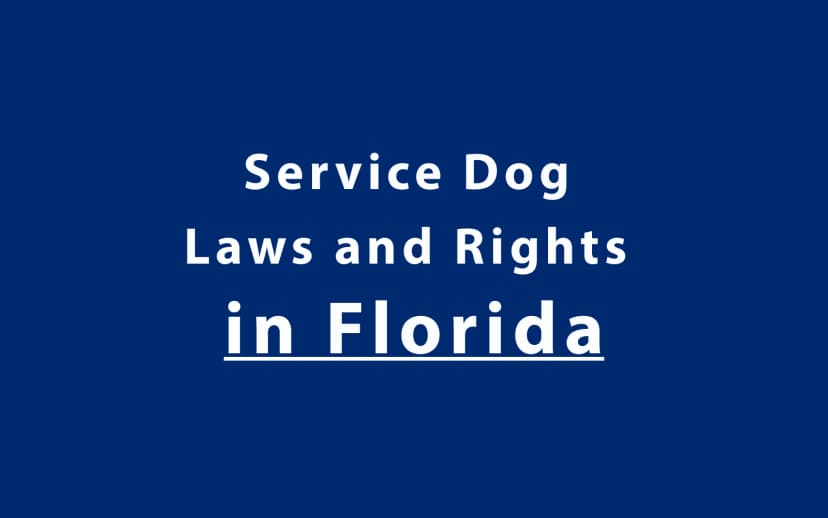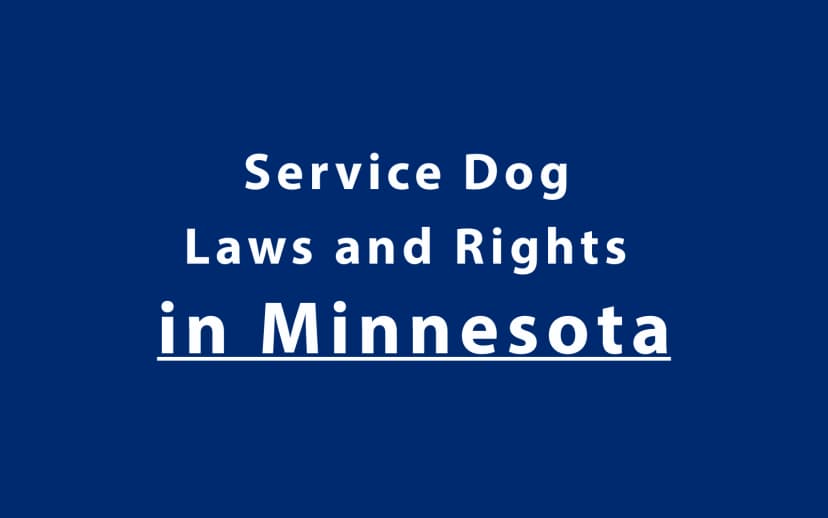Service Dog Laws and Rights in Mississippi

In Mississippi, service dogs play a crucial role in the lives of individuals with disabilities, offering both independence and assistance with daily tasks. Understanding your rights as a service dog handler—or the responsibilities of businesses and landlords when interacting with service dog teams—is essential to promoting accessibility and compliance with federal and state laws.
This article outlines everything you need to know about service dog laws and rights in Mississippi, from legal definitions to training standards and public access protections.
Understanding the Legal Definition of a Service Dog in Mississippi
Under both federal and state law, a service dog is defined as a dog that has been individually trained to perform specific tasks or do work for a person with a disability. These tasks must be directly related to the individual's disability. Common examples include guiding individuals who are visually impaired, detecting seizures, retrieving medication, or providing deep pressure therapy during psychiatric episodes.
In Mississippi, the state follows the federal definition outlined by the Americans with Disabilities Act (ADA). Importantly, this means:
- The animal must be a dog (in some cases, miniature horses are also allowed).
- The dog must be trained to perform a specific task—not just provide emotional comfort.
Emotional support animals (ESAs) and therapy animals do not qualify as service dogs under the ADA or Mississippi law, even if they offer psychological benefits.
Legal Protections for Service Dogs in Mississippi
Public Access Rights
Service dogs in Mississippi have the legal right to accompany their handler into all public areas where the general public is allowed. This includes:
- Restaurants
- Grocery stores
- Hospitals and medical clinics
- Public transportation
- Government buildings
- Hotels and motels
- Parks and recreation facilities
Businesses are not allowed to deny access to a person with a disability because of their service dog. They may only ask two questions:
- Is the dog a service animal required because of a disability?
- What work or task has the dog been trained to perform?
They may not ask for documentation, demand that the dog demonstrate its task, or inquire about the nature of the person's disability.
Handlers are expected to maintain control of their service dogs at all times. This typically means the dog must be leashed or harnessed unless such equipment interferes with the dog’s ability to perform its task.
Housing Rights: Federal and State Laws
Under the Fair Housing Act (FHA), service dogs are granted access to housing, even in buildings that prohibit pets. This federal law applies throughout Mississippi and:
- Prohibits landlords from denying housing to someone because they have a service dog.
- Prevents landlords from charging pet fees, deposits, or extra rent for service dogs.
- Requires landlords to make reasonable accommodations for individuals with disabilities.
While service dogs don’t need to be registered or certified, landlords may ask for documentation that shows the individual has a disability and that the dog is trained to assist with it—especially if the disability is not visible.
Employment Protections
Under Title I of the Americans with Disabilities Act, employers in Mississippi are required to provide reasonable accommodations to qualified individuals with disabilities, which can include allowing a service dog in the workplace.
- Employers can request documentation showing that the dog is necessary and that it has been trained to perform a specific task.
- Employers cannot deny employment or discriminate based on the use of a service dog unless the dog poses a direct threat or causes undue hardship.
If a service dog is disruptive or not housebroken, an employer may have grounds to deny the accommodation, but such cases must be evaluated carefully.
Transportation Access
Service dogs are permitted to accompany their handlers on all forms of public and private transportation in Mississippi, including:
- Buses
- Trains
- Taxis and ride-shares (e.g., Uber and Lyft)
- Commercial airlines (under the Air Carrier Access Act)
The Air Carrier Access Act (ACAA) ensures that individuals with disabilities can travel by air with their service dogs without additional charges. Airlines may request specific DOT forms attesting to the dog's health, behavior, and training—especially for psychiatric service dogs (PSDs). Emotional support animals no longer qualify as service animals on U.S. flights.
Education Settings
Public schools, universities, and other educational institutions in Mississippi must allow students with disabilities to be accompanied by their service dogs. This applies regardless of whether the student is a minor or adult and includes access to:
- Classrooms
- Dormitories
- Dining facilities
- Events open to the public
Schools may not require documentation beyond confirming that the dog is a service animal performing a task related to a disability. For minors, schools may ask that parents complete a care plan, particularly if staff are expected to help with the dog’s management during the school day.
Training and Certification Standards in Mississippi
Mississippi does not require state-specific certification or registration of service dogs. As is consistent with federal law, service dogs are not required to be professionally trained. Handlers may train their own service dog, provided the dog can reliably and safely perform tasks in public.
Best practices for training a service dog in Mississippi include:
- Socialization with people and animals in various settings
- Obedience and control under distraction
- Task-specific training tied to the handler’s disability
- Public access skills such as riding elevators, remaining calm in crowds, and not soliciting food or attention
There are many organizations and trainers that offer service dog training programs, including those tailored for veterans, children with autism, or individuals with psychiatric conditions. Some programs offer certification, but these are voluntary and not required by law.
Misrepresenting a pet as a service dog by purchasing vests or ID cards without proper training is discouraged and may violate local or state laws.
Misrepresentation and Penalties
Falsely claiming a pet as a service dog is illegal in Mississippi. While there is currently no criminal statute with set penalties specifically for misrepresentation, this issue is increasingly addressed through broader fraud or disorderly conduct laws.
Attempting to bring an untrained or misrepresented dog into a public area can result in:
- Removal from the premises
- Fines or citations
- Permanent bans from private businesses
Misuse of service dog equipment such as vests or ID cards to gain access is also a growing concern. Responsible use of service dogs by handlers—and businesses recognizing legitimate teams—helps preserve access rights for everyone.
FAQs: Service Dogs in Mississippi
Do I need to register my service dog in Mississippi?
No. Registration is not legally required at the state or federal level. Be cautious of scams that offer “official” registration for a fee.
Can a landlord charge me extra for my service dog?
No. Under the FHA, landlords cannot charge pet fees or deposits for service dogs.
Can restaurants deny entry to a service dog?
No. As long as the dog is well-behaved and under control, it must be allowed in all public areas of the restaurant.
What happens if my service dog misbehaves in public?
Businesses may ask you to remove the dog if it is disruptive or not housebroken, but they must still allow you to remain on the premises.
Are psychiatric service dogs treated the same as other service dogs?
Yes. If trained to perform a task related to a disability, PSDs are protected under the ADA and ACAA.
Conclusion
Mississippi upholds the federal standards that protect the rights of individuals with disabilities who rely on service dogs for assistance. From public access and housing rights to transportation and employment protections, service dog handlers have legal support across a wide range of settings. While there are no state-specific certification requirements, proper training and responsible behavior are key to ensuring continued access and public trust.
Whether you are considering getting a service dog or seeking to understand your rights as a handler, knowing Mississippi’s laws can empower you to navigate public life with confidence—and with your service dog by your side.



